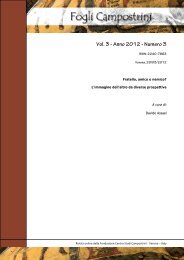Scarica il volume completo - Fogli Campostrini - Fondazione Centro ...
Scarica il volume completo - Fogli Campostrini - Fondazione Centro ...
Scarica il volume completo - Fogli Campostrini - Fondazione Centro ...
Create successful ePaper yourself
Turn your PDF publications into a flip-book with our unique Google optimized e-Paper software.
Vol. 1 ‐ Anno 2012 ‐ Numero 1 Quale esperienza per la f<strong>il</strong>osofia della religione? <strong>Fogli</strong> <strong>Campostrini</strong><br />
D’altra parte è possib<strong>il</strong>e, al modo di Caroline Franks Davis e di Richard Swinburne,<br />
sv<strong>il</strong>uppare un vero e proprio argomento dall’esperienza religiosa, che risale a Dio dalla<br />
premessa fondamentale che moltissime persone hanno avuto esperienze in cui è<br />
sembrato loro di apprendere la realtà divina, dimostrando la veridicità della loro<br />
percezione di Dio, oppure sostenendo che, se Dio esiste, è ragionevole aspettarsi che si<br />
manifesti in determinate occasioni a talune persone, e l’argomento afferma appunto che<br />
questa manifestazione si è verificata spesso: molti hanno fatto esperienza di Dio (o di<br />
realtà soprannaturali connesse con Dio) e quindi hanno conosciuto la sua esistenza e<br />
possono testimoniarla. Anche chi nega che si tratti di un argomento conclusivo spesso<br />
ritiene che sia un argomento ragionevole, che può contribuire a un argomento cumulativo<br />
a sostegno della realtà divina, dove per “argomento cumulativo” si intende non un mero<br />
accumulo di evidenze, ma argomenti che possono interagire in modo tale che <strong>il</strong> loro peso<br />
combinato può superare le inadeguatezze individuali 10 . Dopo avere chiarito la natura e i<br />
diversi tipi di esperienza religiosa (c’è anche un senso in cui l’intera vita può essere una<br />
vasta esperienza religiosa 11 ), ed esaminato in che senso ed entro quali limiti l’esperienza<br />
in generale, pur non implicando ovviamente l’esistenza del suo presunto oggetto, tuttavia<br />
possa costituire un’evidenza prima facie per esso, si giunge alla conclusione che <strong>il</strong><br />
verificarsi di esperienze religiose è prima facie una ragione per credere in Dio. L’eventuale<br />
improbab<strong>il</strong>ità della realtà divina, in questa prospettiva, che è sostanzialmente quella<br />
delineata da Swinburne, costituisce la difficoltà fondamentale, nel senso che <strong>il</strong> problema<br />
nasce quando ci chiediamo se l’esistenza di Dio è così improbab<strong>il</strong>e che un’esperienza,<br />
avente apparentemente per oggetto Dio, in realtà non dovrebbe essere presa come<br />
valida. In questo senso Swinburne può sostenere che l’unico modo per negare che<br />
l’esperienza religiosa offre una buona ragione di credere nella realtà divina è dimostrare<br />
Alston, “Religious Experience Justifies Religious Belief”, in Contemporary Debates in Ph<strong>il</strong>osophy of Religion, a<br />
cura di M.L. Peterson & R.J. VanArragon, Blackwell, Malden-Oxford 2004 (2a ed. 2005), pp. 135-145, e, in<br />
contrasto con Alston, E. Fales, “Do Mystics See God?”, in Ibid., pp.145-158. Cfr. le osservazioni di J.I.<br />
Gellman, “Mysticism and Religious Experience”, in The Oxford Handbook of Ph<strong>il</strong>osophy of Religion, a cura di<br />
W.J. Wainwright, Oxford University Press, Oxford 2005, pp. 138-167. Cfr. M.J. Murray, M.C. Rea, An<br />
Introduction to the Ph<strong>il</strong>osophy of Religion, Cambridge University Press, Cambridge 2008, p. 123: «Belief in<br />
God might be justified even in the absence of propositional evidence. It might, for example, be grounded in<br />
and justified on the basis of some sort of religious experience».<br />
10 Cfr. C. Franks Davis, The Evidential Force of Religious Experience, Clarendon Press, Oxford 1989, p. 109;<br />
R.D. Geivett, “The Evidential Value of Religious Experience”, in The Rationality of Theism, a cura di P. Copan<br />
& P.K. Moser, Routledge, London-New York 2003, p. 196; K.-M. Kwan, “The Argument from Religious<br />
Experience”, in The Blackwell Companion to Natural Theology, a cura di W.L. Craig & J.P. Moreland, W<strong>il</strong>ey-<br />
Blackwell, Malden-Oxford 2009, p. 498. Wainwright applica questa considerazione significativamente anche a<br />
Alston: W.J. Wainwright, “Religious Experience and Religious Pluralism”, in The Ph<strong>il</strong>osophical Challenge of<br />
Religious Diversity, a cura di Ph.L. Quinn & K. Meeker, Oxford University Press, New York-Oxford 2000, p.<br />
224: «My conclusion, then, is this. Whether one is committed to a mystical practice or not, metaphysical and<br />
empirical argumentation of a fam<strong>il</strong>iar sort (arguments for God’s or Nibbāna’s existence, Christian or Buddhist<br />
“evidences”, etc.) is probably needed to show that commitment to an MP [mystical practice] is fully rational.<br />
Alston’s defence of CMP [Christian mystical practice] is impressive and, on the whole, convincing. To be fully<br />
successful, however, I believe it must form part of a persuasive cumulative case argument for the Christian<br />
world-view».<br />
11 R. Swinburne, The Existence of God, Clarendon Press, Oxford 2004², pp. 301-302.<br />
Rivista online della <strong>Fondazione</strong> <strong>Centro</strong> Studi <strong>Campostrini</strong> ‐ Verona – Italy<br />
9




